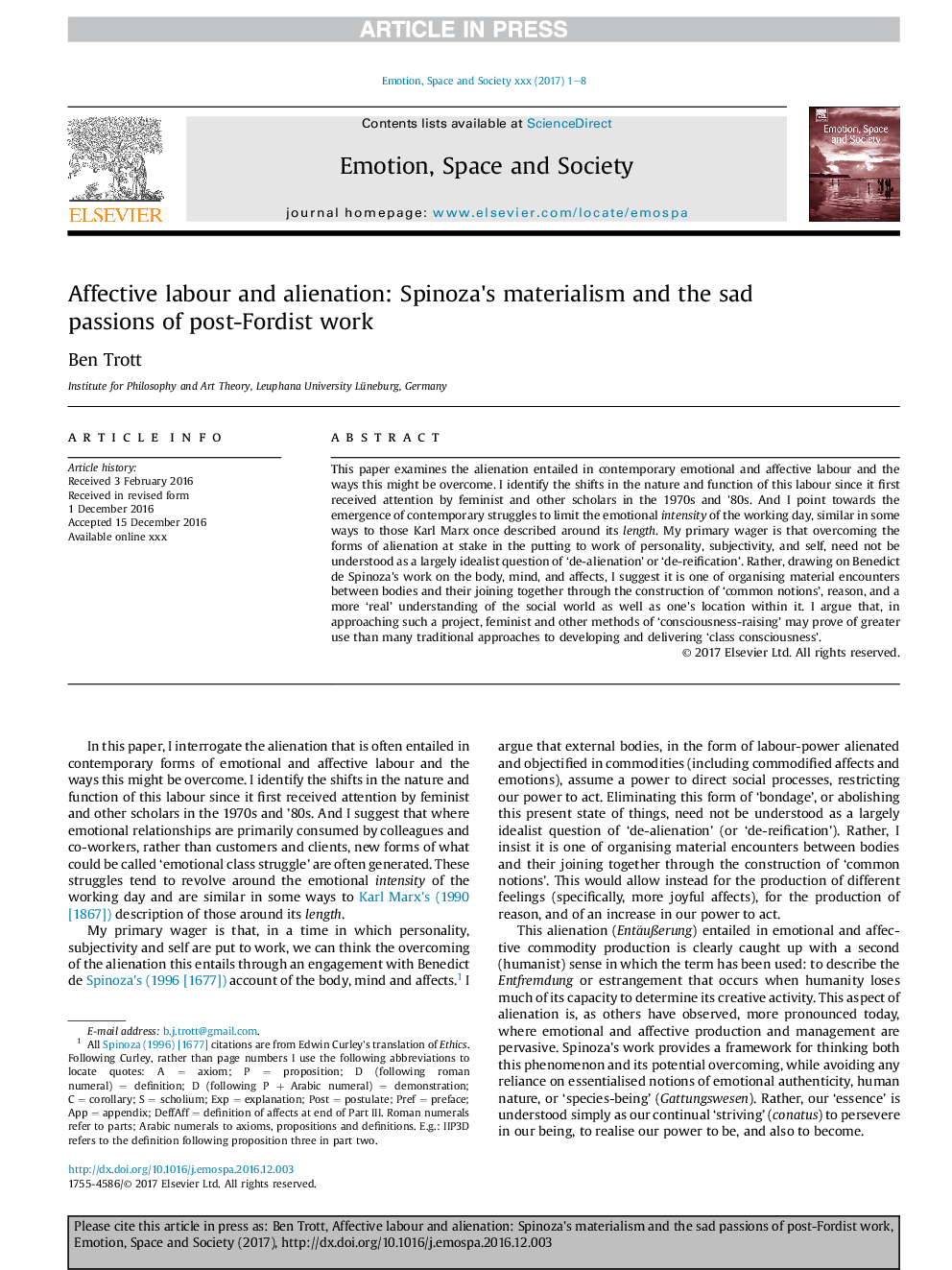| کد مقاله | کد نشریه | سال انتشار | مقاله انگلیسی | نسخه تمام متن |
|---|---|---|---|---|
| 7322930 | 1475622 | 2017 | 8 صفحه PDF | دانلود رایگان |
عنوان انگلیسی مقاله ISI
Affective labour and alienation: Spinoza's materialism and the sad passions of post-Fordist work
ترجمه فارسی عنوان
کار مضر و بیگانگی: ماتریالیسم اسپینوزا و اشتیاق غم انگیز کار پس از فوردیست
دانلود مقاله + سفارش ترجمه
دانلود مقاله ISI انگلیسی
رایگان برای ایرانیان
ترجمه چکیده
این مقاله، بررسی بیگانگی را در کار عاطفی و عاطفی معاصر و روش هایی که ممکن است برطرف شود، مورد بررسی قرار می دهد. من تغییرات در طبیعت و عملکرد این کار را شناسایی می کنم چون اولین بار توسط فمینیست و سایر محققان در دهه های 1970 و 80 به آن توجه شد. و من به سوی ظهور مبارزات معاصر برای محدود کردن شدت عاطفی روز کاری که به نوعی به برخی از آن ها اشاره می شود، اشاره می کنم. وظیفه اولیه من این است که برای رسیدن به کار شخصیت، ذهنیت و خود، تبدیل شدن به شکلهای بیگانگی در معرض خطر قرار گیرد، نیازی نیست که به عنوان یک سوال به طور وسیع ایدهآلیست از «بیگانگی» یا «اصلاح» شناخته شود. در عوض، برنامۀ کار بنیدیک د اسپینوزا بر روی بدن، ذهن و تأثیرات آن، من پیشنهاد می کنم این یکی از سازماندهی برخورد های مادی بین اجسام و پیوستن آنها به یکدیگر با ایجاد "مفاهیم مشترک"، عقل و فهم بیشتر "واقعی" از دنیای اجتماعی و همچنین موقعیت مکانی آن در آن. من استدلال می کنم که در رویکرد چنین پروژه ای، روش های فمینیستی و دیگر روش های "افزایش آگاهی" می تواند از استفاده بیشتر از بسیاری از روش های سنتی برای توسعه و تحقق «آگاهی طبقاتی» اثبات کند.
موضوعات مرتبط
علوم انسانی و اجتماعی
روانشناسی
روانشناسی اجتماعی
چکیده انگلیسی
This paper examines the alienation entailed in contemporary emotional and affective labour and the ways this might be overcome. I identify the shifts in the nature and function of this labour since it first received attention by feminist and other scholars in the 1970s and '80s. And I point towards the emergence of contemporary struggles to limit the emotional intensity of the working day, similar in some ways to those Karl Marx once described around its length. My primary wager is that overcoming the forms of alienation at stake in the putting to work of personality, subjectivity, and self, need not be understood as a largely idealist question of 'de-alienation' or 'de-reification'. Rather, drawing on Benedict de Spinoza's work on the body, mind, and affects, I suggest it is one of organising material encounters between bodies and their joining together through the construction of 'common notions', reason, and a more 'real' understanding of the social world as well as one's location within it. I argue that, in approaching such a project, feminist and other methods of 'consciousness-raising' may prove of greater use than many traditional approaches to developing and delivering 'class consciousness'.
ناشر
Database: Elsevier - ScienceDirect (ساینس دایرکت)
Journal: Emotion, Space and Society - Volume 25, November 2017, Pages 119-126
Journal: Emotion, Space and Society - Volume 25, November 2017, Pages 119-126
نویسندگان
Ben Trott Ben Trott,
